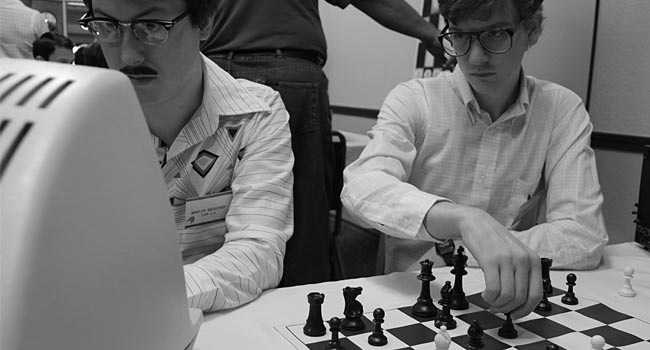
An element of randomness wonderfully juxtaposes the calculated game of chess and world of computer programming.

An element of randomness wonderfully juxtaposes the calculated game of chess and world of computer programming.
Mumblecore extraordinaire Andrew Bujalski’s (director of Funny Ha Ha and Beeswax) latest effort expands upon his mumblecore roots by wrapping it around a mockumentary format of storytelling that is lensed with aesthetically accurate 80’s technology. The largest achievement the film earns is due to the lo-fi visual flair, which at times feels as brilliant as it does experimental. Computer Chess is an undeniably courageous indie film that seems complacent towards pleasing a limited audience.
Set in an unmistakable time period of the 1980’s, Computer Chess follows several computer programmers as they compete with their software to try and beat an actual human chess player at an annual conference. The film purposely comes off as a low-budget documentary with peculiar editing and amateur looking footage using the same camera technologies that are authentic to the time. Each of the computer programmers in the competition fit the stereotypical image of a nerd: thick-rim glasses, light colored button-up shirt equipped with pocket protectors, more interested in computers than women, and all fascinated at which the speed of technology is progressing which will allow their programs to become even more powerful.
The first couple of days prove to be disastrous for the defending champs who cannot seem to figure out what is wrong with their software that is losing games almost immediately. But that is not the most unthinkable thing to happen at this year’s tournament. In what seems to be a first occurrence of its kind, a female competitor joins the field that is dominated by males, but is surprisingly not a major factor of the story until the end when a conversation sparks about how the future of dating will be changed by computers (essentially forecasting online dating).

Computer Chess does briefly bring up the discussion of artificial intelligence on a few occasions but only highlights its importance instead of making it a major plot point. It may have been better suited had the film been less focused on trying to work as a comedy and more towards an insightful piece on the philosophy of artificial intelligence. Similar to H.A.L. 9000 from 2001: A Space Odyssey, there are a few scenes that imply that computers are self-aware and could be watching us, but they fizzle out rather quickly.
You must be willing to embrace some of the randomness that the director throws at you throughout the film such as; a bizarre scene that is filmed in color with audio that is out of sync that eventually ends up on repeat (symbolizing an infinite-loop in the programming world) and a motel that permits cats to wander around for reasons that are not exactly apparent. Comic relief is provided by a hilarious performance by Myles Paige, who plays a cheapskate programmer that spends the entire film looking for an extra room to sleep in without paying for it. Sometimes there seems to be little method to its madness, but the film’s off-the-wall mannerisms mostly work by adding to its charm.
It does take talent to produce such an original story and concept such as the one featured in Computer Chess, regardless that all of its pieces are not completely cohesive. There are jokes that do not register and scenes that do not make sense, which adds an element of randomness that wonderfully juxtaposes the calculated game of chess and world of computer programming. Computer Chess bounces around between playful humor and thoughtful technology speculation so freely that even a modern computer program could not predict its next moves.